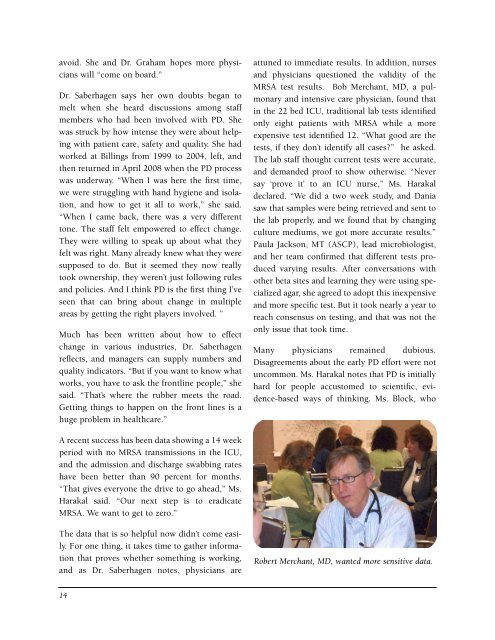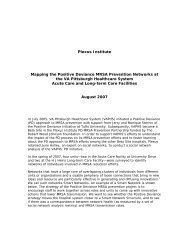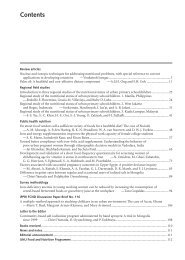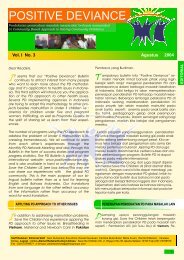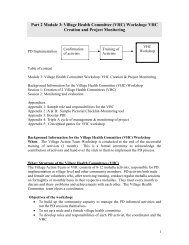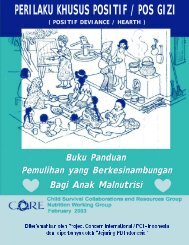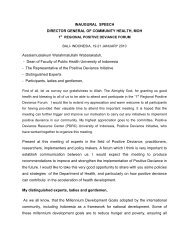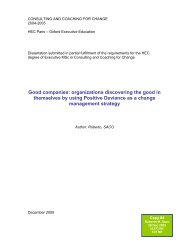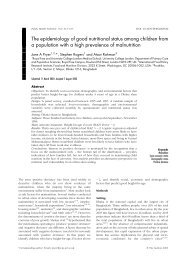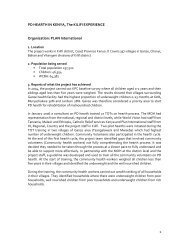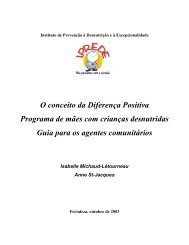From Invisible to Visible - Positive Deviance Initiative
From Invisible to Visible - Positive Deviance Initiative
From Invisible to Visible - Positive Deviance Initiative
Create successful ePaper yourself
Turn your PDF publications into a flip-book with our unique Google optimized e-Paper software.
avoid. She and Dr. Graham hopes more physicians<br />
will “come on board.”<br />
Dr. Saberhagen says her own doubts began <strong>to</strong><br />
melt when she heard discussions among staff<br />
members who had been involved with PD. She<br />
was struck by how intense they were about helping<br />
with patient care, safety and quality. She had<br />
worked at Billings from 1999 <strong>to</strong> 2004, left, and<br />
then returned in April 2008 when the PD process<br />
was underway. “When I was here the first time,<br />
we were struggling with hand hygiene and isolation,<br />
and how <strong>to</strong> get it all <strong>to</strong> work,” she said.<br />
“When I came back, there was a very different<br />
<strong>to</strong>ne. The staff felt empowered <strong>to</strong> effect change.<br />
They were willing <strong>to</strong> speak up about what they<br />
felt was right. Many already knew what they were<br />
supposed <strong>to</strong> do. But it seemed they now really<br />
<strong>to</strong>ok ownership, they weren’t just following rules<br />
and policies. And I think PD is the first thing I’ve<br />
seen that can bring about change in multiple<br />
areas by getting the right players involved. ”<br />
Much has been written about how <strong>to</strong> effect<br />
change in various industries, Dr. Saberhagen<br />
reflects, and managers can supply numbers and<br />
quality indica<strong>to</strong>rs. “But if you want <strong>to</strong> know what<br />
works, you have <strong>to</strong> ask the frontline people,” she<br />
said. “That’s where the rubber meets the road.<br />
Getting things <strong>to</strong> happen on the front lines is a<br />
huge problem in healthcare.”<br />
attuned <strong>to</strong> immediate results. In addition, nurses<br />
and physicians questioned the validity of the<br />
MRSA test results. Bob Merchant, MD, a pulmonary<br />
and intensive care physician, found that<br />
in the 22 bed ICU, traditional lab tests identified<br />
only eight patients with MRSA while a more<br />
expensive test identified 12. “What good are the<br />
tests, if they don’t identify all cases?” he asked.<br />
The lab staff thought current tests were accurate,<br />
and demanded proof <strong>to</strong> show otherwise. “Never<br />
say ‘prove it’ <strong>to</strong> an ICU nurse,” Ms. Harakal<br />
declared. “We did a two week study, and Dania<br />
saw that samples were being retrieved and sent <strong>to</strong><br />
the lab properly, and we found that by changing<br />
culture mediums, we got more accurate results.”<br />
Paula Jackson, MT (ASCP), lead microbiologist,<br />
and her team confirmed that different tests produced<br />
varying results. After conversations with<br />
other beta sites and learning they were using specialized<br />
agar, she agreed <strong>to</strong> adopt this inexpensive<br />
and more specific test. But it <strong>to</strong>ok nearly a year <strong>to</strong><br />
reach consensus on testing, and that was not the<br />
only issue that <strong>to</strong>ok time.<br />
Many physicians remained dubious.<br />
Disagreements about the early PD effort were not<br />
uncommon. Ms. Harakal notes that PD is initially<br />
hard for people accus<strong>to</strong>med <strong>to</strong> scientific, evidence-based<br />
ways of thinking. Ms. Block, who<br />
A recent success has been data showing a 14 week<br />
period with no MRSA transmissions in the ICU,<br />
and the admission and discharge swabbing rates<br />
have been better than 90 percent for months.<br />
“That gives everyone the drive <strong>to</strong> go ahead,” Ms.<br />
Harakal said. “Our next step is <strong>to</strong> eradicate<br />
MRSA. We want <strong>to</strong> get <strong>to</strong> zero.”<br />
The data that is so helpful now didn’t come easily.<br />
For one thing, it takes time <strong>to</strong> gather information<br />
that proves whether something is working,<br />
and as Dr. Saberhagen notes, physicians are<br />
Robert Merchant, MD, wanted more sensitive data.<br />
14


